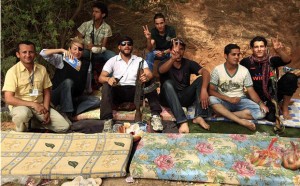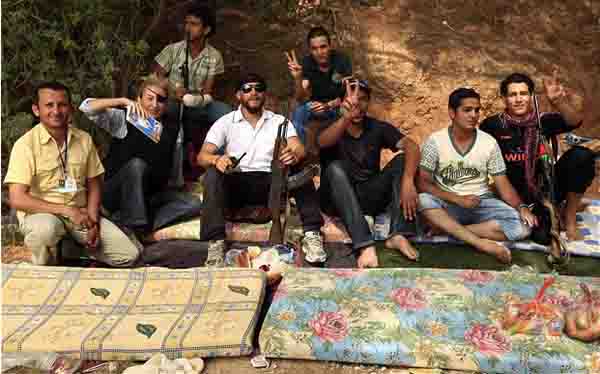Two journalists who covered the brutal fighting in Libya have been killed by a Syrian shell while continuing their fearless reporting, . . .[restrict]this time in another country whose dictatorial regime has turned its guns on its own people.
Marie Colvin, the distinguished American-born Middle East correspondent of the UK’s Sunday Times and award-winning 28 year old French photojournalist Remi Ochlik were both killed yesterday when a Syrian shell hit the make-shift rebel press centre in the Baba Amr suburb of Homs. Both journalists had worked on the rebel side in Libya and had covered the four-month siege of Misrata.

Colvin in particular won the affection of many of the fighters and civilians in Misrata. She shared with them the danger of indiscriminate shelling and sniper fire from Qaddafi’s forces, which killed two other renowned international journalists, Tim Hetherington and Chris Hondros, (See Libya Herald February 20 feature article “Libya’s Other War Dead”).
With a black patch over her left eye, an incongruous pair of glasses perched on her face for her other eye and a slightly gravelly voice, the 55 year old Colvin struck a memorable figure. She impressed the people in Misrata by her calm and her compassion. It is unlikely that many of the Libyans she met among the ruins of the besieged city realised she was a highly experienced war correspondent, who had been reporting for 25 years from the thick of conflicts around the world including the Gulf war, Bosnia, Kosovo, Chechnya, Iraq and Afghanistan. Indeed the distinctive eye patch replaced an eye lost to a shrapnel burst in Sri Lanka in 2001.
Two years ago, Colvin made a speech commemorating 48 UK-based reporters who have already been killed so far this century. She said “It has never been more dangerous to be a war correspondent, because the journalist in the combat zone has become a prime target.”
Yet, she added, the correspondent’s job was to report the horrors of war with accuracy and without prejudice.
“?Our mission is to speak the truth to power. We send home that first rough draft of history. We can and do make a difference in exposing the horrors of war and especially the atrocities that befall civilians.”
It was not widely known that after the explosion that lost her her eye, Colvin suffered a breakdown, ascribed to Post Traumatic Stress. She overcame this in part by taking up dinghy racing. After her injury, she did not have to return to war reporting. A highly respected writer of her calibre could have turned successfully to the far less risky field of feature writing. But she wanted to continue to cover warfare, not, as some blogger commented viciously yesterday, because she was “a war junkie” but because she had learnt how to cover warfare and bring to the outside world, its depravity, its cruelty and its wastefulness.
She did not have to return to Syria either. She had been thinking of coming back to Libya to see for herself the revolution one year on. While waiting for an official Syrian visa, she asked a colleague if she should fly to Tripoli. The understandable advice was that Syria was the bigger story. Nevertheless, had Colvin come to Libya, she would still be alive today and Libya would not be mourning the loss of a brave, unbiased journalist and a good and valued friend. [/restrict]








